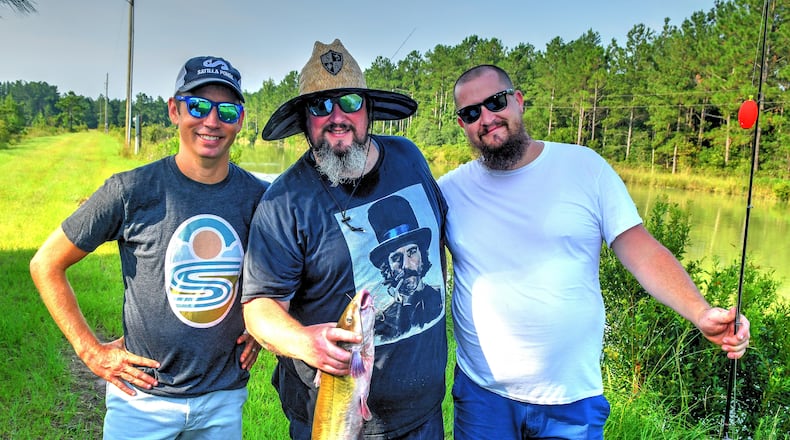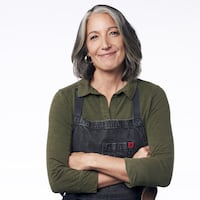Obscured by brush, a rather plain-looking pond sits on the longest dirt road in Camden County. However, for owner Zack Gowen, those 3 acres of water in rural White Oak are an investment in the future.
He’s banking on the catfish teeming below the surface not only to feed guests at his Georgia Sea Grill on St. Simons Island, but also eventually to be sold to other restaurants and seafood purveyors in the Golden Isles that want to offer organically fed, locally raised fish to customers.
Gowen is a restaurant industry lifer. He didn’t know the first thing about raising catfish when he started Satilla Ponds fishery a couple of years ago.
Why catfish? “Everybody loves catfish,” he said. “It seemed like something unique.”
And, he thought it might be wise to diversify.
Gowen readily will admit that the learning curve has been steep, and that the project wouldn’t have come this far without Satilla Ponds manager Eric Miller.
Miller drives a stretch of that endless, sand-dusted, unpaved road in Camden County every day to feed the fish, check the water quality, set traps for crawfish, and fend off gators and other predators with a 12-gauge shotgun.
Weekdays, chores wait until classes have ended at the high school where Miller teaches math. Sundays are the fun days. He throws rods, a tackle box, bait and an ice-filled cooler in the bed of his pickup to spend half the day casting and reeling, so that Georgia Sea Grill Executive Chef Tim Lensch and his culinary team can fill orders for blackened fish tacos and fried catfish.
Credit: Chris Hunt
Credit: Chris Hunt
Reeling in a 5-pound catfish is a thrill, but it’s not the most efficient way to operate a fishery. Miller hopes to install a mechanized harvesting system with seine netting pulled by a 1964 diesel tractor. Parts, such as a hydraulic pump, have been hard to come by, especially during the pandemic.
The fledgling fishery has overcome other challenges. Miller and Gowen wanted the aquaculture endeavor to be as sustainable as possible, including raising the catfish on organic feed. With no clear guidelines for organic catfish practices at his disposal, Miller turned to a Kansas City company to develop a custom feed for Satilla Ponds.
The pond was stocked on three occasions between January, 2019, and March, 2020. The population is healthy and reproducing, but it takes about 18 months for catfish to reach a desirable size. “It’s a waiting game,” Miller said.
There’s plenty more to the waiting game. This pond is one of seven on property that sat dormant for years. For the others to become operational, they’ll have to undergo the same cleaning, aerator installation and stocking strategy as the first.
Credit: Chris Hunt
Credit: Chris Hunt
Gowen is patient, knowing that this pond-to-plate idea is part of a larger vision, to fill a void for fresh, sustainable, locally grown food on Georgia’s southern coast. The big picture involves yet another farm.
Potlikker Farm is a vegetable farm on Blythe Island, about 30 miles north of Satilla Ponds, and in view of the hulking Georgia Pacific paper plant in Brunswick. Gowen purchased that 6.5-acre property in 2018, having been inspired after reading “The Potlikker Papers: A Food History of the Modern South” by Southern foodways authority John T. Edge.
Gowen had watched Sapelo Farms, one the few organic farms in the area, relocate to Rome, Ga. Here was his chance to change things around in the community where he grew up. Moreover, the property was on a road named Potlikker’s Place, because a shrimp boat called the Potlikker was grounded there in the off-season. As Gowen tells it, “Things started clicking.” He forked over the money.
Credit: Chris Hunt
Credit: Chris Hunt
As with Satilla Ponds, Gowen needed help. Potlikker Farm is a one-person show run by Sam McPherson. A Navy veteran who also holds a culinary degree and has family ties to farming, McPherson was running an organic co-op when the two men met. His background makes him an ideal fit to run what he calls a “clean food” farm.
Rather than pesticides and other chemicals, McPherson relies on natural remedies to deter harmful insects and to beckon beneficial ones. Lemongrass, for example, helps with the former; sunflowers planted as plot borders attract pollinators. He also starts every new swath of land with a crop of Sea Island red peas, to give the acidic soil a nitrogen boost.
Credit: Chris Hunt
Credit: Chris Hunt
McPherson, who lives on the farm with wife, April, and their daughter, Ella, gave a quick tour of the greenhouse, where seedlings were enjoying the tropical heat wave.
“July and August are oppressively hot, but it’s great for starting seeds,” McPherson said. “Most people take this month off. It’s too hot, and the water requirements are crazy.”
Credit: Chris Hunt
Credit: Chris Hunt
McPherson currently farms less than 2 acres of the land, using nothing more complicated than a walk-behind tiller and a lawn tractor. Among the latest improvements are a hoop house, and a walk-in cooler that enables McPherson to store food temporarily, instead of transporting it the same day it’s harvested.
Potlikker holds certified naturally grown status, a peer-to-peer certification viable for small farms, because there’s less paperwork and it’s free. “It is very trust-based, but farmers are so glad to be certified something,” McPherson said.
While candy roaster squash, okra, Thai eggplant and jalapenos are just a few of the Potlikker crops that made their way onto the Georgia Sea Grill menu this summer, they also got directly into the hands of the general public.
Credit: Chris Hunt
Credit: Chris Hunt
McPherson is a regular vendor at the Mary Ross Farmers Market in Brunswick, where he counts himself as the only “local clean grower.”
“It’s disheartening to see other good farms leave,” McPherson said, citing the departure not only of Sapelo Farms, but also Canewater, which moved its organic operation from Darien clear across the country to Teton Valley, Idaho. But, like Gowen, he’s committed to planting seeds here for the long term. So committed, in fact, that Gowen hopes to sell him the farm.
Gowen has enough other projects to stay busy. Besides keeping Georgia Sea Grill afloat, he needs to secure the lease on a commissary kitchen for his Three Little Birds Coastal Catering, get the food truck that he purchased a year and a half ago into gear, and open the Crest on Newcastle, a rooftop bar and restaurant in Brunswick that was going full speed ahead until COVID-19 stalled it.
The farms, though, are important parts of the operation that would supply each of his businesses and, as they grow in scale, other area restaurants and markets, as well.
“Why isn’t anybody doing this?” Gowen asked himself when he first pondered adding farm owner to his list of responsibilities.
Three years later, he is the one “doing this.”
Credit: Chris Hunt
Credit: Chris Hunt
On a muggy Sunday morning in August, he stood on the bank of his pond with his 9-year-old daughter, Hope, math teacher-cum-catfish farm manager Miller and trusted chef Lensch. Each had a rod in hand, waiting for something to bite.
“It’s just all about getting systems down,” Gowen said.
About the Author
The Latest
Featured










